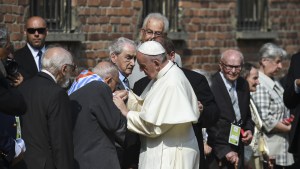Before he was captured by the Nazis and thrown into a concentration camp during World War II, Viktor Frankl was an accomplished neurologist, psychiatrist, and professor. But his experience of the worst kind of suffering and affronts to human dignity taught him invaluable lessons about human nature, hope, and happiness.
After escaping from the camps that killed his wife, parents, and brother, Frankl went on to found Logotherapy, inspired by the idea that the most powerful force in a human’s life is the desire for meaning, which Frankl wrote about in his best-selling book about his survival, Man’s Search for Meaning.

Read more:
The Pope and the Holocaust: I am proudly and humbly connected to both
Before his death in 1977 at the age of 92, Frankl was interviewed on the CBC’s Man Aliveand two excerpts from that show demonstrate why he remains so influential — and even counter-cultural. Frankl, who received 29 honorary doctoral degrees and many prestigious awards, said that the phrase “the pursuit of happiness,” is a contradiction in terms:
Happiness can never be really pursued; happiness is a by-product — and must remain that way — of pursuing a task or a person other than yourself. This becomes most obvious in sexual neuroses … precisely in so far as a person is hunting, chasing, pursuing his own happiness and pleasure, he is doomed to failure … The more you give yourself, the more you forget yourself, in love or in work, for the sake of a cause to serve or a person to love, you will become happy precisely by not caring for happiness, by overlooking and forgetting whether you are happy or not.
This is what self-transcendence is about, according to Frankl — not being primarily concerned with yourself, but something — or better yet — someone other than yourself. “Man becomes himself, man actualizes his self, man is human precisely to the extent to which he is not concerned with himself …”
